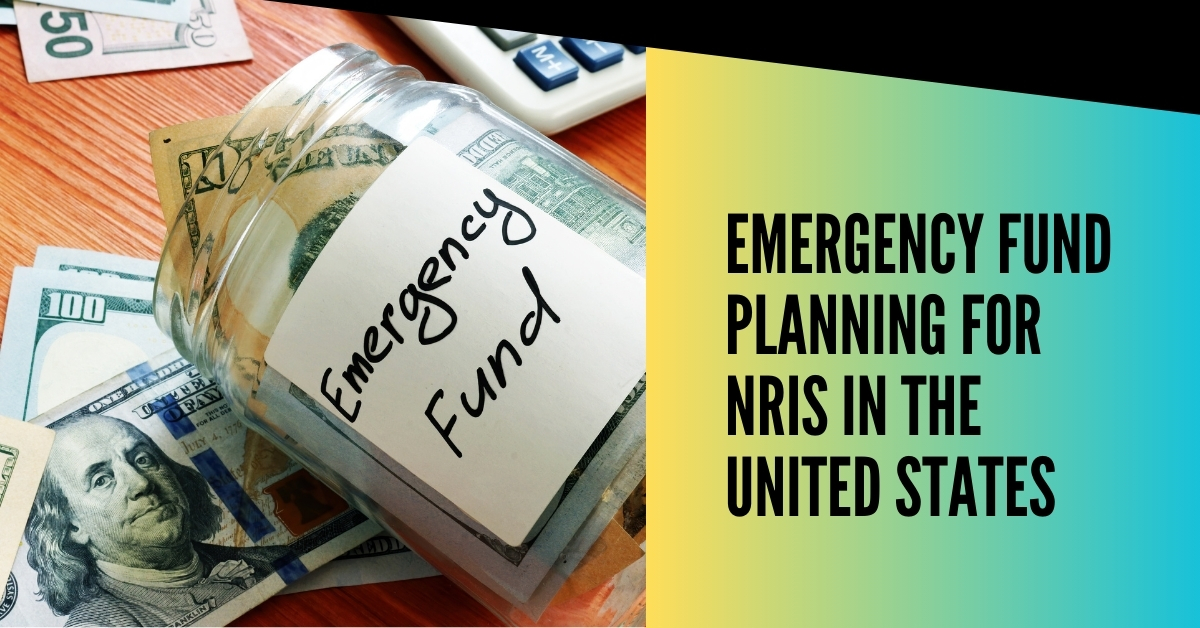Emergency Fund Planning for NRIs in the United States

Emergency fund planning is a cornerstone of financial stability, providing protection in the event of an unexpected financial crisis. For Non-Resident Indians (NRIs) living in the United States, it is essential to establish and maintain an emergency fund to navigate through uncertain times. This comprehensive guide will delve into the importance of emergency fund planning for NRIs in the United States, offering valuable insights and practical advice to help you build a robust financial foundation.
Importance of Emergency Funds:
Life is unpredictable, and unexpected expenses can arise at any moment. Whether it’s a medical emergency, sudden unemployment, or vehicle repairs, having an emergency fund ensures that you are well-prepared to handle these financial challenges without compromising your long-term savings or falling into debt. For NRIs in the United States, having an emergency fund provides a crucial safety net, especially given the potential challenges of being away from home and support networks during an emergencies.
Determining the Appropriate Savings Amount:
One of the first steps in emergency fund planning is determining how much you can save. While the general rule is to save on living expenses for three to six months, NRIs may want to consider saving more because of the potential complications of deportation.
Factors to consider when determining the appropriate amount are:
Monthly expenses: Calculate your monthly expenses including housing, utilities, groceries, transportation, healthcare, and other necessary expenses.
Stable income: Check the stability of your income and employment status. If your income fluctuates or is uncertain, you may want to set aside a larger emergency fund.
Family Size: Consider the size of your family and the dependents who rely on your financial support.
Financial Responsibility: Account for any financial obligations, such as loan repayments or insurance premiums, that are your responsibility.
Where to Keep Your Emergency Fund in the US ?
In order to keep your emergency fund in the United States, immigrants should consider the following options, which provide income, access, and protection:
- High-yield savings accounts: offers competitive interest rates and is easily accessible through online banking.
- Money Market Accounts (MMA): Offer higher interest rates than traditional savings accounts with check writing and debit card privileges.
- Online banking: offers affordable interest rates and is easily accessible through online banks.
- Bank or credit union savings accounts: Offer FDIC or NCUA insurance and are easily available through local branches.
- Money Market Deposits (MMDA): offer higher interest rates than conventional savings accounts and are easily accessible through local branches.
The Role of Insurance in Emergency Fund Planning
Insurance plays a crucial role in enhancing financial security and complementing emergency funds. NRIs should consider various types of insurance, such as health, life, disability, homeowners, renters, and auto insurance, to protect their financial well-being. Insurance policies provide additional financial protection during unforeseen events, ensuring that NRIs can access necessary care without depleting their emergency funds. Additionally, NRIs should regularly review their insurance policies to ensure that they remain relevant and adequate for their needs. By combining insurance policies with an emergency fund, NRIs can create a comprehensive financial safety net that protects them against unexpected events.
The Impact of Taxation on Emergency Funds
The impact of taxation on emergency funds is a crucial consideration for NRIs in the United States. While the funds saved in an emergency account are not subject to taxation, it’s essential to be aware of the tax implications of the investment vehicles used for the emergency fund. For instance, interest earned on an NRO account is taxable at 30% according to the Income Tax Act. By understanding the tax implications of different investment options, NRIs can make informed decisions to ensure that their emergency funds remain easily accessible and tax-efficient, providing the necessary financial support during unexpected events
Tips for Managing Your Emergency Fund:
- Set smaller savings goals: Break down your overall savings goal into smaller, more manageable targets.
- Start with small, regular contributions: Begin with a small amount that you can afford without straining your budget.
- Automate your savings: Set up automatic transfers from your checking account to your emergency fund.
- Use a high-yield savings account: Choose an account that offers a competitive interest rate and easy access.
- Keep your emergency fund separate: Avoid using your emergency fund for non-emergency expenses.
- Monitor your spending: Regularly assess your spending habits to ensure that you are not overspending.
- Adjust your contributions: Increase your contributions as your financial situation improves.
- Save your tax refund: Use your tax refund to boost your emergency fund.
- Use mobile technology: Utilize savings apps that round up your purchases and transfer the extra amount to your emergency fund.
- Keep your emergency fund accessible: Ensure that your emergency fund is easily accessible in case of an unexpected event.
Conclusion:
In conclusion, emergency fund planning is a vital aspect of financial security for NRIs in the United States. By setting up and managing an emergency fund, NRIs can deal with unexpected financial challenges. For personalized guidance and expert advice on emergency fund planning and other financial matters, consider consulting an experienced NRI financial planner in the United States. Using their expertise, you can create a comprehensive financial plan that protects your financial future and helps you achieve your long-term goals.



